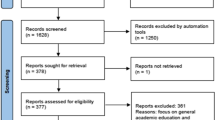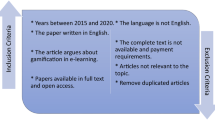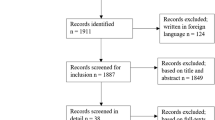Abstract
The popularity of Massively Multiplayer Online Role-Playing Games (MMORPGs) has risen greatly over the last few years. To date there has been very little published academic research concerning online gaming and even less on the different types of online games that exist. Given the lack of data, a scoping study was undertaken to examine the extent, range and nature of different MMORPGs. Data were collected relating to the twenty most popular MMORPGs. The primary aim was to present a summarised overview of all material reviewed. The secondary aim was to provide a thematic construction in order to present a narrative account of existing MMORPG literature. Overall, the scoping study found that whilst some games had received moderate, or even substantial attention, others have had no research conducted upon them at all. This presents a problem since the growth in both the player base and the industry suggests that a single psychological profile of ‘the gamer’ cannot be relied upon, and as such further research is required. It is hoped that this study suggests ways forward and helps set research agendas for future research into MMORPGs.
Similar content being viewed by others
References
Arksey, H., & O’Malley, L. (2005). Scoping studies: towards a methodological framework. International Journal of Social Research Methodology, 8(1), 19–32.
Bye, C. M. (2007). An in-depth review of RuneScape. Online available at http://www.tentonhammer.com/node/8862. Accessed 23 November 2007.
Chappell, D., Eatough, V. E., Davies, M. N. O., & Griffiths, M. D. (2006). EverQuest—It’s just a computer game right? An interpretative phenomenological analysis of online gaming addiction. International Journal of Mental Health and Addiction, 4, 205–216.
Chiou, W. (2007). Using cognitive dissonance to induce adolescents’ escaping from the claw of online gaming: The roles of personal responsibility and justification of cost. CyberPsychology and Behavior, 10, 663–670.
Cole, H., & Griffiths, M. D. (2007). Social interactions in massively multiplayer role-playing gamers. CyberPsychology and Behavior, 10, 575–583.
Griffiths, M. D., Davies, M. N. O., & Chappell, D. (2003). Breaking the stereotype: The case of online gaming. CyberPsychology and Behavior, 6, 81–91.
Griffiths, M. D., Davies, M. N. O., & Chappell, D. (2004). Online computer gaming: A comparison of adolescent and adult gamers. Journal of Adolescence, 27, 87–96.
Griffiths, M. D., Davies, M. N. O., & Chappell, D. (2004). Demographic factors and playing variables in online computer gaming. CyberPsychology and Behavior, 7, 479–487.
Grüsser, S. M., Thalemann, R., & Griffiths, M. D. (2007). Excessive computer game playing: Evidence for addiction and aggression? Cyberpsychology and Behavior, 10, 290–292.
Hursthouse, J. (2005). MMOG demographics: perspectives from industry insiders. IGDA Online Games Quarterly, 1(2), 1–12.
Kraczeck, L. (2007). Runescape review. Online available at: http://www.mpogd.com/news/?ID=2951. Accessed 23 November 2007.
Lotroignvault.com (2007). Online. Available at http://lotrovault.ign.com/?dir=sympoll&dispid=15. Accessed 1 October 2007.
Mays, N., Roberts, E., & Popay, J. (2001). Synthesising research evidence. In N. Fulop, P. Allen, A. Clarke, & N. Black (Eds.), Studying the organisation and delivery of health services: Research methods. London: Routledge.
MMOGchart.com (2007). Online. Available at: http://mmogchart.com. Accessed 1 October 2007.
MMORPG. com (2007). Online. Available at: http://www.mmorpg.com. Accessed 19 September 2007.
Papagiannidis, S., Bourlakis, M., & Li, F. (2008). Making real money in virtual worlds: MMORPGs and emerging business opportunities, challenges and ethical implications in metaverses. Technological Forecasting & Social Change, 75(5), 610–622.
Shieh, K., & Cheng, M. (2007). An empirical study of experiential value and lifestyles and their effects on satisfaction in adolescents: An example using online gaming. Adolescence, 42, 199–215
Taylor, L. (2003). Multiple pleasures: Women and online gaming. Convergence, 9(1), 21–46.
Wan, C. (2006). Why are adolescents addicted to online gaming? An interview study in Taiwan. CyberPsychology and Behavior, 9, 762–766.
Wan, C. (2007). The motivations of adolescents who are addicted to online games: A cognitive perspective. Adolescence, 42, 179–197.
Warcry.com (2007). Lord of the Rings Online: Warcry’s review. Online. Available at: http://www.warcry.com/news/view/72789-Lord-of-the-Rings-Online-WarCrys-Review. Accessed 1 October 2007.
Whang, L., & Chang, G. (2004). Lifestyles of virtual world residents: Living in the on-line game “Lineage”. CyberPsychology and Behavior, 7, 592–600.
Williams, D. (2007). Can you hear me now? The impact of voice in an online gaming community. Human Communication Research, 33, 427–449.
Womengamers.com (2007). A Second Life with Robin Harper. Online. Available at: http://www.womengamers.com/articles/robin.php. Accessed 20 September 2007.
Wood, R. T. A., Griffiths, M. D., Chappell, D., & Davies, M. N. O. (2004). The structural characteristics of video games: A psycho-structural analysis. CyberPsychology and Behavior, 7, 1–10.
Wood, R. T. A., Griffiths, M. D., & Eatough, V. (2004). Online data collection from videogame players: Methodological issues. Cyberpsychology and Behavior, 7, 511–518.
Yee, N. (2006). The demographics, motivations and derived experiences of users of massively-multiuser online graphical environments. PRESENCE: Teleoperators and Virtual Environments, 15, 309–329.
Yee, N. (2007). The Daedalus Project. Online. Available at: www.nickyee.com/daedalus/archives/001302.php?page=1. Accessed 19 September 2007.
Author information
Authors and Affiliations
Corresponding author
Rights and permissions
About this article
Cite this article
Meredith, A., Hussain, Z. & Griffiths, M.D. Online gaming: a scoping study of massively multi-player online role playing games. Electron Commer Res 9, 3–26 (2009). https://doi.org/10.1007/s10660-009-9029-1
Published:
Issue Date:
DOI: https://doi.org/10.1007/s10660-009-9029-1




